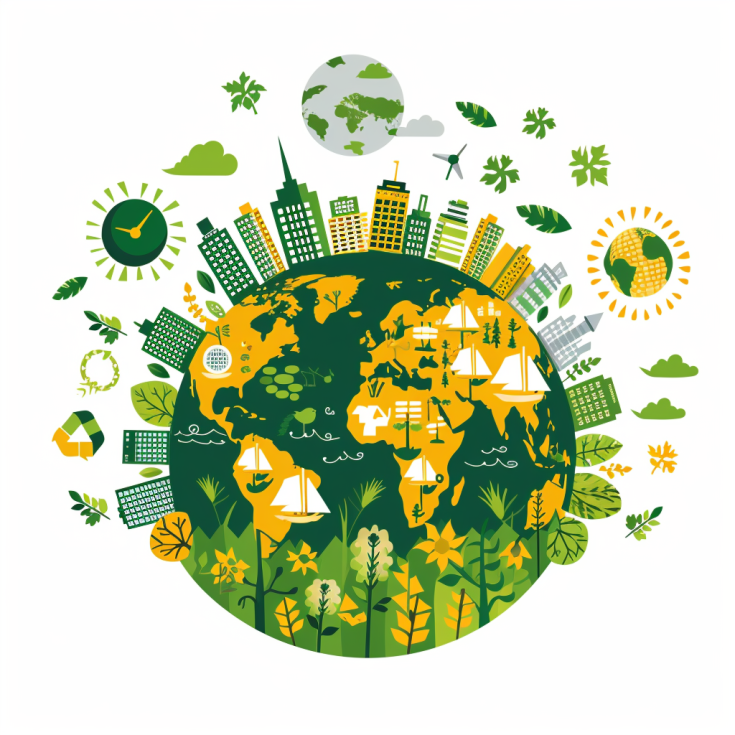Sustainability Communication in Tourism

Environmental sustainability in business practices is becoming increasingly important. Our planet cannot sustain the business models of the previous decades. Regulators and policy-makers expect greener practices from business whether it is through the Energy Labels or Corporate Sustainability Reporting Directive (CSRD). But demand comes also from the citizenry.
More and more citizens are environmentally conscious and therefore expect sustainable products, services and business practices or else they choose a different provider.
The story is no different in the tourism industry. Already since 2007, with its “Agenda for a sustainable and competitive European tourism”, the European Commission has set out recommendations on how the sector could be more sustainable. The competitiveness and sustainability of the tourism industry go hand-in-hand as the quality of tourist destinations is strongly influenced by their natural and cultural environment and by their integration into the local community.
In recent years more and more travellers have chosen more sustainable accommodation or travel options and are in general interested to keep their footprint on the local environment minimal.
At the same time, the buzz around sustainability also creates the risk of greenwashing or impact washing where deceptive marketing tactics are used to trick customers. Therefore, on the one hand, it is vital that the sustainability of businesses is evidenced. On the other, it is important that those who truly are taking the steps to be sustainable stand out. SMEs need to figure out how to get their message across to customers in an accurate, clear and trustworthy way.
Part of the answer could lie in labels and certifications from trustworthy authorities, like the EU Ecolabel which is available to tourism accommodation services willing to prove and promote their environmental excellence or Green Key which certifies tourism enterprises across the world. But a lot can also be done directly by the SMEs by improving their daily sustainability communication.
Sustainability communication
Sustainability communication encompasses the methods and messages with which the company engages its customers, employees and other stakeholders about its sustainability commitments, practices and achievements. The objectives are to:
- Inform – spread the knowledge about the company’s sustainability practices, sustainable choices, importance of sustainability in general and inform that the company fulfils sustainability criteria.
- Motivate – customers and other stakeholders to make more sustainable choices.
- Engage – invite the stakeholders to interact with the company and help develop the sustainability practices together.
Ideally, sustainability communication should stem from the company’s broader sustainability strategy which in turn should be inseparable from the overall business strategy. If sustainability practices are embedded in the core of the business, then greenwashing due to malicious intent or incompetence is less likely.
The bottom line is that sustainability communication needs to be credible. In March 2024 the EU Parliament adopted the Green Claims Directive demanding that claims around sustainability would be backed by evidence before they can be communicated.
A self-assessment tool to assist tourism SMEs
The self-assessment tool for digital sustainability communication is a low-threshold way for SMEs to improve their online and offline communication on sustainability. It is a Good Practice put forward by the Interreg Europe TOURBO project.
The tool was developed by the Lapland University of Applied Sciences as part of another ERDF-supported project in 2023 (VALUE - Growth and Value through Sustainability Communication). It is a user-friendly tool for addressing the challenge of effectively communicating sustainability efforts, particularly for micro-businesses in the tourism sector.
The tool was created because it was observed that less is communicated than accomplished by the Lapland tourism companies. A study in Finland has shown that tourism companies can refrain from communicating about their sustainability for various reasons: they do not think there is anything special to talk about, they find it difficult, they are uncertain about their own sustainability, they do not want to spoil the holiday feeling of customers or they simply forget to communicate.
The tool essentially functions as a self-evaluation checklist with 20 items. It is easy to understand with step-by-step information on how to improve every aspect of a SMEs sustainability communication online and offline and how to make these improvements measurable, stimulating continuous development. The tool is free of charge for companies. It is promoted actively by Lapland Tourism Ecosystem stakeholders together with national Business Finland/Visit Finland.
Accompanying the tool is also a video lecture about sustainable communication. In addition to some of the aspects mentioned above, the video also recommends strategies and tactics for tourism providers. For example, in verbal communication, a SME should be accurate, comparable and positive while in non-verbal communication the SME should be certified, visible, authentic and internalised. More details on what is meant by these keywords are available in the video.
Considering stricter sustainability regulations, such as the Green Claims Directive mentioned above, practices such as the self-assessment tool from Lapland are increasingly important to help SMEs on their sustainability communication. SMEs require assistance to navigate the rapidly changing legal landscape appropriately. Such support measures are especially worthwhile considering that some SMEs refrain from talking about their steps towards sustainability out of fear of being perceived as taking part in greenwashing.
Therefore, while public authorities across Europe are setting up schemes and initiatives to support SMEs in their sustainable innovation and green transition, they should not forget the accompanying communication skills and know-how of local SMEs – otherwise they might take a risk averse approach and not capitalize on the actual good work they have been doing on becoming sustainable.

Sustainable tourism collection
Interested in learning more about sustainable tourism? Our experts hand-picked the most relevant content for you!
